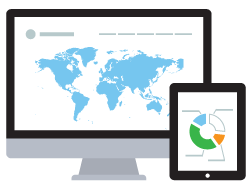Social media is an invaluable platform for any professional or company to communicate with current and potential customers. It has given anyone with internet access a platform to voice their opinions and be heard. Customers use social media to review items they’ve purchased, places they’ve been, or services they’ve received. This is also where the public gets an idea of the “personality” of your business. That’s where we come in!
Facebook isn’t the only social media site out there. There are hundreds of websites like Twitter, LinkedIn, Google +, MySpace and Pinterest, just to name a few. Facebook is by far the biggest and broadest of all social media sites; however, there are sites out there that are a lot more focused and demographic-specific. We are the experts at finding what sites are the most beneficial for you, and we maintain your presence in those communities.
Read on to discover a more in-depth look at how a social media strategy will work for your business.
1. Online Reputation Management
Now and then your customers will have an issue with products and services they receive. It is in the company’s best interest to see that these issues are resolved. Your customer satisfaction most certainly shouldn’t be left to chance. Unfortunately for you, their first instinct is not to contact the company any longer; rather, in this day and age, it is easier for them to log into a social account where the first question is “What’s on your mind?” and where they answer by telling their friends about their frustrations. By monitoring social media sites we are listening to your customers and are addressing concerns as they arise, preventing negative word-of-mouth (which can be the single most destructive force against your bottom line) and significantly increasing customer satisfaction at the same time.
2. Market Analysis
Social media is a great way to drive traffic to your site and test new products by promoting sweepstakes and give-away contests. Once you’ve identified your target market/audience, you can open the floodgates of valuable feedback. Listen to what they’re saying and respond. If they aren’t happy with your service or product, we can identify the problem, offer a solution, and then top it off with a retribution like a coupon or free item. If they are happy with your service, we can capitalize on that by broadcasting your success. Also consider this perspective: if you notice a competitor under-performing, you can step in and be the hero of the situation by offering the same product with better service!
3. Market Presence and Exposure
Imagine you are carrying out your daily activities and a company approaches you, offering some useful information or assisting you with a problem you are having, without ever trying to sell you something. It is so rare in our modern culture, chances are you are going to remember that company and the next time you need their services you will be more likely to contact them. Social media allows you to reach out to your customers and offer relevant and useful information without aggravating them with a constant sales pitch. Creating chatter about governmental changes relevant to your business, a community health awareness notice, or a reminder to move clocks ahead this weekend will encourage your customers to trust your company. They notice when businesses are involved in their community, and that leads to positive word-of-mouth.
4. Personal Relationship with Current Customer
Studies are proving every day the extreme value of an emotional connection with companies. Social media allows you to reward your loyal or new customers the moment they exhibit positive (revenue-generating) behaviors. This also means that a sense of transparency is now expected, even demanded, by the consumer in order to gain their trust. Consumers are aware that their trust in a company has huge implications for that company’s success, and they hold onto it tightly. This also means the slightest “public relations blunder” could have huge ramifications if not handled professionally. It’s a tight-rope walk, a juggling act of managing your business objectives vs. your public relationship. Fortunately for you, this is one of our many strengths that you benefit from as our client. We are experts at communicating, which means less confusion among your customers and more trust, which leads to — you guessed it — more free word-of-mouth advertising and a heftier bottom line.





Social Media
Social Media and Your Business
1. Online Reputation Management
Now and then your customers will have an issue with products and services they receive. It is in the company’s best interest to see that these issues are resolved. Your customer satisfaction most certainly shouldn’t be left to chance. Unfortunately for you, their first instinct is not to contact the company any longer; rather, in this day and age, it is easier for them to log into a social account where the first question is “What’s on your mind?” and where they answer by telling their friends about their frustrations. By monitoring social media sites we are listening to your customers and are addressing concerns as they arise, preventing negative word-of-mouth (which can be the single most destructive force against your bottom line) and significantly increasing customer satisfaction at the same time.2. Market Analysis
Social media is a great way to drive traffic to your site and test new products by promoting sweepstakes and give-away contests. Once you’ve identified your target market/audience, you can open the floodgates of valuable feedback. Listen to what they’re saying and respond. If they aren’t happy with your service or product, we can identify the problem, offer a solution, and then top it off with a retribution like a coupon or free item. If they are happy with your service, we can capitalize on that by broadcasting your success. Also consider this perspective: if you notice a competitor under-performing, you can step in and be the hero of the situation by offering the same product with better service!3. Market Presence and Exposure
Imagine you are carrying out your daily activities and a company approaches you, offering some useful information or assisting you with a problem you are having, without ever trying to sell you something. It is so rare in our modern culture, chances are you are going to remember that company and the next time you need their services you will be more likely to contact them. Social media allows you to reach out to your customers and offer relevant and useful information without aggravating them with a constant sales pitch. Creating chatter about governmental changes relevant to your business, a community health awareness notice, or a reminder to move clocks ahead this weekend will encourage your customers to trust your company. They notice when businesses are involved in their community, and that leads to positive word-of-mouth.4. Personal Relationship with Current Customer
Studies are proving every day the extreme value of an emotional connection with companies. Social media allows you to reward your loyal or new customers the moment they exhibit positive (revenue-generating) behaviors. This also means that a sense of transparency is now expected, even demanded, by the consumer in order to gain their trust. Consumers are aware that their trust in a company has huge implications for that company’s success, and they hold onto it tightly. This also means the slightest “public relations blunder” could have huge ramifications if not handled professionally. It’s a tight-rope walk, a juggling act of managing your business objectives vs. your public relationship. Fortunately for you, this is one of our many strengths that you benefit from as our client. We are experts at communicating, which means less confusion among your customers and more trust, which leads to — you guessed it — more free word-of-mouth advertising and a heftier bottom line.